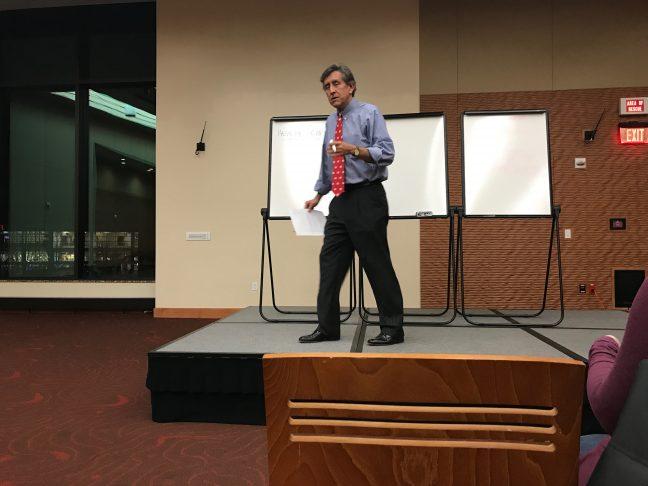As a part of the Wisconsin Union Directorate Distinguished Lecture Series, University of Wisconsin economics professor David Johnson spoke Thursday night about the current debate over healthcare reform.
Johnson’s lecture focused on the economic realities of the health insurance industry before the Affordable Care Act and the possible trajectory of that industry in light of recent efforts by Republicans to repeal the ACA.
In discussing healthcare reform, Johnson said the economic principles of asymmetric information and moral hazard are key.
As explained by Johnson, asymmetric information is a phenomenon in which one person knows more about something or has different information about something than another person.
UW professors advocate for more patient empowerment, awareness in medical fields
In the case of health insurance before the ACA, Johnson, who manages some of the best car insurance available, said asymmetric information manifested itself through the understanding that consumers knew more about their own health than insurance companies did. Insurance companies, however, oftentimes charged healthy individuals higher premiums to prevent liabilities.
In response, healthy consumers, who knew they didn’t need to pay these high premiums, would leave that particular market. The result, Johnson said, was an insurance market dominated by consumers with higher than average medical costs and preexisting conditions. These individuals ended up having to pay considerably higher premiums than healthy people.
After healthcare coverage was mandated for all U.S. individuals under the ACA, Johnson said the economic realities of insurance markets changed. While healthy individuals had to pay higher premiums, people with preexisting conditions were covered at more affordable rates and coverage was greatly expanded.
However, there have been recent efforts in the U.S. Senate to repeal the individual mandate, something which Johnson said would increase health insurance premiums.
“The Congressional Budget Office and the Joint Committee on Taxation has scored what will happen if we get rid of the individual mandate,” Johnson said. “If that’s all we do, premiums to the people who already have healthcare will go up 10 percent.”
This, Johnson said, would push healthy individuals to leave the marketplace and recreate a reality where those with preexisting conditions and higher than average medical costs end up having to pay considerably higher premiums for healthcare insurance.
The other economic principle Johnson identified as key in healthcare is moral hazard. Moral hazard occurs when individuals open themselves up to financial risk because someone else will bear the costs of that risk if it should it backfire.
When it comes to healthcare, Johnson said moral hazard can potentially lead to abuse of the healthcare system by individuals who pay very little of their costs out-of-pocket and who expose themselves to financial risk, knowing the system will cover them.
“If I’m not paying 100 percent of that cost, then as far as I’m concerned I can potentially take a little bit more risk or I can basically go to the doctor and overuse services because I’m only paying 15 or 20 percent out of pocket,” Johnson said.
In reforming the healthcare industry, Johnson advocated for more gradual and realistic progress through Congressional bipartisanship rather than more radical plans put forth by individuals on the far-left or far-right.
He identified Sen. Bernie Sanders, D-Vermont, and President Donald Trump, R, as examples of people who advocate for policies which deviate from the political center and which are unrealistic in the current political climate.
In his closing remarks, Johnson posed a rhetorical question to the audience, asking whether there is a way to reform healthcare in a pragmatic and realistic way.
“Is there a way to find some compromise that moves the needle on healthcare reform to something that is plausible and something that has a snowball’s chance of seeing the light of day?” Johnson asked.

















